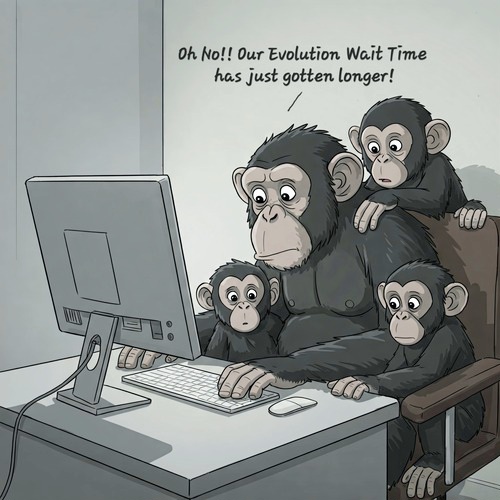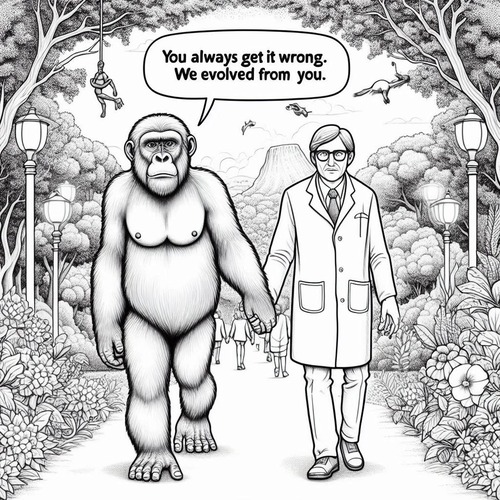Failing the Math Test: Darwinism’s Wait Time Problem
In the grand narrative of origins, evolutionary theory has long been presented as an unassailable scientific truth. Textbooks, documentaries, and academic circles have championed the idea that given enough time, random mutations could transform simple organisms into the breathtaking complexity of life we observe today. But what if this compelling story crumbles under the weight of mathematical scrutiny?
DARWINISM’S WAIT TIME PROBLEM? WHAT’S THAT?
The wait time problem exposes the mathematical impossibility of random mutations generating complex biological systems within the timeframe proposed by evolutionary theory. It reveals the time required for meaningful genetic changes far exceeds the estimated age of the universe, challenging the core premise of Darwinian evolution. Essentially, it’s a critical mathematical argument that suggests life’s complexity cannot be explained by chance and time alone.
THE FUNDAMENTAL CHALLENGE
At the heart of evolutionary theory lies a seemingly simple premise: given millions of years, random genetic changes can accumulate to create new, more complex life forms. It’s an elegant narrative—but is it mathematically feasible?
The Probability Puzzle: Consider the formation of a single protein—a fundamental building block of life. The probability of generating a functional protein through random mutation is astronomically low. Imagine trying to create a specific sequence of 150 amino acids. The mathematical odds are staggering:
- Total possible amino acid combinations: 20^150
- Estimated number of atoms in the universe: Approximately 10^80
The numbers don’t just suggest improbability—they scream impossibility. It’s akin to randomly generating a perfect Shakespearean sonnet by repeatedly smashing keys on a typewriter, expecting coherence to emerge from chaos.
IRREDUCIBLE COMPLEXITY: A TIME-SENSITIVE DILEMMA
Many biological systems simply cannot function in partially developed states. Take the bacterial flagellum—a microscopic motor that requires multiple precisely assembled proteins to work. If even one component is missing or incorrectly formed, the entire mechanism fails. How could such a complex system “evolve” incrementally when intermediate stages would be non-functional?
The Information Barrier: Genetic information isn’t just a random collection of molecules—it’s a sophisticated code more complex than any human-designed communication system. Creating new genetic information isn’t like adding random letters to a word; it requires precise, purposeful changes that maintain the integrity of the entire genetic message.
EXPERT VOICES OF SCEPTICISM
Numerous scientists have raised critical questions about the time required for evolutionary changes:
- Douglas Axe’s research suggests that functional protein sequences are extremely rare among possible amino acid combinations.
- Mathematicians have calculated that the time required for significant evolutionary changes far exceeds the estimated age of the universe.
BEYOND RANDOM CHANCE
The wait time problem isn’t just a minor hiccup in evolutionary theory—it’s a fundamental mathematical contradiction. The idea that random processes could generate the intricate, interdependent systems we observe in living organisms defies basic principles of probability.
A More Rational Explanation: Intelligent design offers a compelling alternative. Just as a complex computer program requires intentional design, the sophisticated machinery of life suggests purposeful creation rather than accidental emergence.
CONCLUSION: AN INVITATION TO CRITICAL THINKING
The wait time problem exposes a critical weakness in the evolutionary narrative. It’s not about dismissing scientific inquiry, but about honestly examining the mathematical impossibilities that underlie current theories of origins.
We invite readers to approach this topic with open minds, rigorous scientific scepticism, and a willingness to challenge established narratives. The origins of life are too important to be accepted without thorough, critical examination.
The wait time problem isn’t just a mathematical curiosity—it’s a profound challenge to the very foundations of evolutionary theory, inviting us to look deeper into the origins of life’s magnificent complexity.
DARWINISM’S WAIT TIME PROBLEM: RELATED FAQs
How do creationists view genetic mutations? Creationists see genetic mutations not as creative mechanisms of evolution, but as degrades that typically harm or reduce genetic information. Mutations are viewed as random errors that demonstrate the precision of original design rather than a pathway to increased complexity. They argue that observed mutations consistently show loss of information, not the generation of new, more sophisticated genetic codes.
- Why can’t complex biological systems evolve gradually? Many biological systems require multiple precisely coordinated parts to function, making gradual evolution impossible. The bacterial flagellum, for instance, is an irreducibly complex molecular machine that cannot work with even a single component missing. This suggests these systems must have been designed comprehensively from the beginning, as partial systems would provide no survival advantage.
- What scientific principles challenge evolutionary time estimates? Information theory and probability mathematics fundamentally challenge evolutionary time assumptions. The astronomical odds against generating functional proteins through random processes far exceed the potential time available, even if we accept conventional geological time estimates. These mathematical constraints suggest that the complexity of life requires intentional design rather than accidental formation.
- How do creationists explain biological diversity? Creationists propose that biological diversity results from designed genetic potential within original created kinds, allowing for variation and adaptation within specific limits. This concept of “microevolution” explains observable changes in populations without requiring the massive transformative changes proposed by evolutionary theory. The diversity we see is viewed as a testament to the sophistication of original design, not a process of random mutation.
- What about fossil record gaps? The fossil record is seen as evidence against gradual evolutionary change, showing sudden appearances of complex life forms with no transitional intermediate stages. Creationists argue these gaps are not “missing links” but fundamental evidence of purposeful creation. The abrupt emergence of fully formed, complex organisms in geological strata suggests design rather than gradual transformation.
How does intelligent design differ from traditional creationism? Intelligent design focuses on scientific evidence for purposeful creation, using mathematical and informational arguments to challenge random evolutionary mechanisms. While traditional creationism often emphasizes biblical narratives, intelligent design presents a more technical approach, arguing that the complexity of life requires an intelligent source. It seeks to provide a scientifically rigorous alternative to naturalistic evolutionary explanations.
DARWINISM’S WAIT TIME PROBLEM: OUR RELATED POSTS
Editor's Pick

Self-Authentication: Why Scripture Doesn’t Need External Validation
"How can the Bible prove itself? Isn't that circular reasoning?" This objection echoes through university classrooms, coffee shop discussions, and [...]

Do Christians Need Holy Shrines? Why the Reformed Answer Is No
Walk into a medieval cathedral and you'll encounter ornate shrines, gilded reliquaries, and designated "holy places" where pilgrims gather to [...]

I Want To Believe, But Can’t: What Do I Do?
"I want to believe in God. I really do. But I just can't seem to make it happen. I've tried [...]

BC 1446 or 1250: When Did the Exodus Really Happen?
WHY REFORMED SCHOLARS SUPPORT THE EARLY DATE Many a critic makes the claim: “Archaeology has disproven the biblical account [...]

Does God Know the Future? All of It, Perfectly?
Think about this: our prayers tell on us. Every time we ask God for something, we’re confessing—often without realising it—what [...]

Can Christian Couples Choose Permanent Birth Control?
Consider Sarah, whose fourth pregnancy nearly killed her due to severe pre-eclampsia, leaving her hospitalised for months. Or David and [...]

Bone of My Bones: Why Eve Was Created From Adam’s Body
"This at last is bone of my bones and flesh of my flesh!" Adam's joyful exclamation upon first seeing Eve [...]

Is Calvinism Fatalism in Christian Disguise? Think Again
We hear the taunt every now and then: "Calvinism is just fatalism dressed up in Christian jargon." Critics argue Reformed [...]

Can Churches Conduct Same-Sex Weddings?
In an era of rapid cultural change, churches across America face mounting pressure to redefine their understanding of marriage. As [...]

Gender Reassignment: Can Christian Doctors Perform These Surgeries?
In the quiet of a clinic, a Christian physician faces a challenging ethical question. A patient sits across the desk, [...]
SUPPORT US:
Feel the Holy Spirit's gentle nudge to partner with us?
Donate Online:
Account Name: TRUTHS TO DIE FOR FOUNDATION
Account Number: 10243565459
Bank IFSC: IDFB0043391
Bank Name: IDFC FIRST BANK






